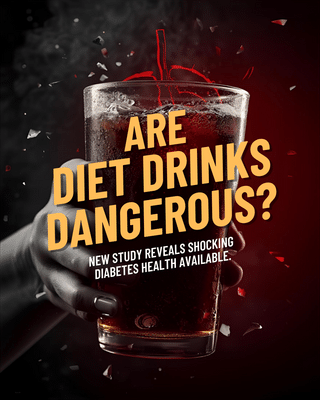We have all seen the zero-sugar, diet-branded soft drinks glistening in the fridge and marketed as the savvy choice for cutting calories without sacrificing flavour but what if choosing that “healthier” option quietly carries its own risks? A recent 2025 large Australian study by Monash University, published in Diabetes & Metabolism, tracked more than 36,000 adults over roughly 14 years and found that drinking just one can of an artificially-sweetened soft drink per day was associated with a 38% higher risk of developing type 2 diabetes, compared to very low intake. That risk (38 %) was higher than the 23 % increased risk found among daily consumers of sugar-sweetened soft drinks.
What makes this counter-intuitive is that the elevated risk for the “diet” (artificial-sweetener) group remained even after adjusting for body-mass index (BMI) and waist-to-hip ratio. In other words, the association was not simply about weight gain. “Artificial sweeteners are often recommended to people at risk of diabetes as a healthier alternative,” said lead author Prof. Barbora de Courten. “But our results suggest they may pose their own health risks.”

The diabetes risk tied to artificially-sweetened beverages appears independent of obesity/weight gain, hinting at potential direct metabolic effects (gut-microbiome disruption, altered glucose handling).
What this means for your lifestyle
If you are choosing diet sodas or artificially-sweetened drinks thinking “at least I’m avoiding sugar,” this study suggests that there is more to the story. Here's what experts suggest for everyday life -
The observational study could not prove causation, self-reported beverage intake and no data on which exact sweeteners were consumed. It may still be confounded by other lifestyle factors. The authors call for further mechanistic research but the message is simple that switching from sugar to artificial sweeteners is not a guaranteed “health upgrade.” This new long-term research from Australia raises serious questions about whether diet drinks, long seen as the lesser evil, might carry hidden metabolic risk.
For a healthier, lower-risk lifestyle, it is wiser to minimise sweetened drinks altogether (even the zero-sugar ones) and make water, unsweetened beverages and whole-food choices your mainstay. Your body, your metabolism and your future self will thank you.
Note: The information provided in this article is for educational purposes only and is not intended as medical advice. Always consult with a healthcare professional before starting any new medication or treatment.
What makes this counter-intuitive is that the elevated risk for the “diet” (artificial-sweetener) group remained even after adjusting for body-mass index (BMI) and waist-to-hip ratio. In other words, the association was not simply about weight gain. “Artificial sweeteners are often recommended to people at risk of diabetes as a healthier alternative,” said lead author Prof. Barbora de Courten. “But our results suggest they may pose their own health risks.”

The diabetes risk tied to artificially-sweetened beverages appears independent of obesity/weight gain, hinting at potential direct metabolic effects (gut-microbiome disruption, altered glucose handling).
What this means for your lifestyle
If you are choosing diet sodas or artificially-sweetened drinks thinking “at least I’m avoiding sugar,” this study suggests that there is more to the story. Here's what experts suggest for everyday life -
- Water first: Plain water remains the safest, lowest-risk hydration option. If you crave flavour, add fruit-infused water, sparkling water with a lemon or herbal teas.
- Limit both sugary and artificially sweetened drinks: Both were linked with heightened diabetes risk but ASBs showed a stronger association after accounting for weight.
- Read beyond “zero sugar” labels: Just because a drink is sugar-free doesn’t mean it’s metabolically inert.
- Look at the bigger picture: Habitual intake of diet drinks may correlate with other less-healthy behaviours (snacking, sedentary time) or may signal underlying risk factors — so don’t rely solely on switching to diet beverages as a “fix.”
- Support your metabolism with good basics: Focus on minimally processed foods, whole grains, lean protein, plenty of veg and fruit, good sleep and regular movement. These remain key to reducing diabetes risk.
- For kids and teens especially: The “zero-sugar” branding sometimes makes diet soda feel like a safe treat. Parents should model healthier alternatives and reduce reliance on any sweetened beverage as a daily habit.
The observational study could not prove causation, self-reported beverage intake and no data on which exact sweeteners were consumed. It may still be confounded by other lifestyle factors. The authors call for further mechanistic research but the message is simple that switching from sugar to artificial sweeteners is not a guaranteed “health upgrade.” This new long-term research from Australia raises serious questions about whether diet drinks, long seen as the lesser evil, might carry hidden metabolic risk.
For a healthier, lower-risk lifestyle, it is wiser to minimise sweetened drinks altogether (even the zero-sugar ones) and make water, unsweetened beverages and whole-food choices your mainstay. Your body, your metabolism and your future self will thank you.
Note: The information provided in this article is for educational purposes only and is not intended as medical advice. Always consult with a healthcare professional before starting any new medication or treatment.
You may also like

Bangladesh to host Zakir Naik nine years after Dhaka attack ban

Mumbai-based Vinyl Chemicals' Q2 net profit falls 44 pc

'Exquisite' period drama with 'first rate' cast streaming on BBC now

Migrant hotels scandal as 'incompetent' Home Office wastes billions of tax-payer cash

Major Surrender: 21 Maoists Lay Down Arms in Chhattisgarh, Including Senior Leaders







